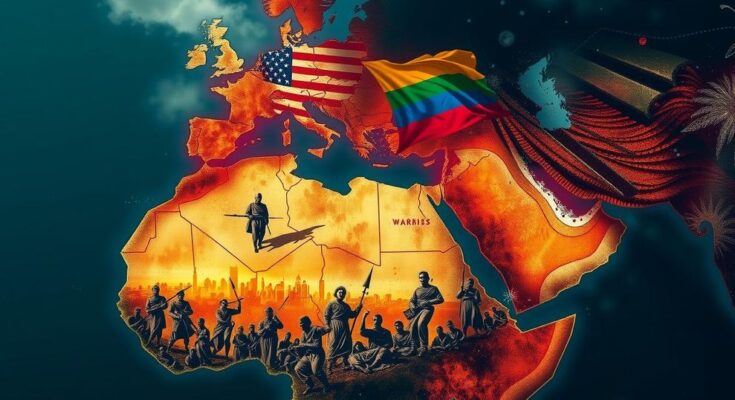Tensions are rising in the Horn of Africa as Egypt, Somalia, and Eritrea contemplate forming a collective security alliance against Ethiopia, amidst ongoing civil unrest in Ethiopia and a controversial agreement with Somaliland. This alliance may exacerbate regional instability, prompting potential proxy conflicts reminiscent of the Cold War, especially among competing interests in the region.
The Horn of Africa is experiencing a resurgence of tensions as Egypt, Somalia, and Eritrea deliberate the formation of a collective security alliance aimed at countering Ethiopia. This diplomatic shift has emerged as the leaders of these nations convened in Asmara, Eritrea, on October 10, 2024. Their discussions have raised alarms regarding the stability of the region, particularly given the backdrop of Ethiopia’s ongoing civil conflict that has claimed hundreds of thousands of lives. Since August 2024, Egypt has established military cooperation and intelligence sharing arrangements with Somalia and is poised to cement similar security agreements with Eritrea. The collaboration among Eritrean President Isaias Afwerki, Egypt’s President Abdel Fattah al-Sisi, and Somalia’s President Hassan Sheikh Mohamud marks a critical juncture that may redefine the geopolitical dynamics of the Horn of Africa. Tensions had already escalated due to Ethiopia’s controversial agreement with Somaliland—a region that has sought independence from Somalia since 1991. This deal would grant Ethiopia vital access to the Red Sea via the port of Berbera, whilst simultaneously recognizing Somaliland’s sovereignty—a concept that has not gained international recognition until recently. Somalia has vehemently opposed this agreement, viewing it as a breach of its territorial sovereignty. The resentment felt by Egypt and Eritrea towards Ethiopia’s actions further complicates an already volatile situation. Egypt, having longstanding disputes with Ethiopia regarding the Grand Ethiopian Renaissance Dam, perceives this dam as a direct threat to its water security. The port deal with Somaliland raises the possibility of Ethiopia establishing a maritime military base, causing alarm within Eritrea regarding Ethiopian naval activities in close proximity. The formation of this anti-Ethiopian coalition might be diplomatically favorable for Egypt. However, the benefits for Somalia and Eritrea appear limited, especially given Somalia’s own internal strife. Al Shabab, Somalia’s extremist group, continues to gain strength, which poses a significant threat to the government’s ability to exert control beyond the capital, Mogadishu. Eritrea remains internationally isolated and continues to endure sanctions, while its potential collaboration with Ethiopia to address mutual threats from the Tigray region adds another layer of complexity. The Tigray People’s Liberation Front (TPLF), engaged in a brutal struggle for autonomy against the Ethiopian government, has resulted in a humanitarian crisis, with millions at risk of starvation. Although a full-scale regional war is unlikely at this juncture, the alignment of Egypt, Somalia, and Eritrea against Ethiopia suggests an impending rise in proxy conflicts reminiscent of Cold War dynamics. Economic sanctions and increased diplomatic tensions could severely affect trade routes, and the geopolitical landscape may face profound shifts. As these developments unfold, they warrant significant attention from global powers due to their potential ramifications for regional and global stability. As the specifics of the alliance are being hammered out, the declaration already paints a tumultuous picture for interstate relations in the Horn of Africa. This alliance could either pressure Ethiopia into reconsidering its actions regarding Somaliland or escalate tensions further, potentially leading to a prolonged conflict and deepening regional rivalries. Ethiopia has adopted a cautiously observant stance, delaying moves related to the Somaliland agreement, but any emerging dialogue between Somaliland and Ethiopian leadership may provoke a more assertive response from Egypt and its allies. The Horn of Africa, fraught with its multi-faceted conflicts, stands on the precipice of greater instability. If the situation is not addressed earnestly by the international community, we may witness a catastrophic escalation in violence that could overshadow recent conflicts in terms of devastation and humanitarian disaster. As stated, “nothing is more dangerous than sincere ignorance.” Ignoring the intricate dynamics at play in the Horn of Africa could have perilous consequences for global peace and security.
The Horn of Africa has long been a focal point of geopolitical strife, characterized by complex inter-state tensions and local conflicts. The recent civil war in Ethiopia, exacerbated by significant loss of life and displacement, underscores the volatility of the region. Concurrently, Ethiopia’s controversial agreements, particularly with Somaliland, signify a pivotal shift, invoking adverse reactions from neighboring nations such as Somalia, Egypt, and Eritrea. These developments come amid historical grievances over water rights, territorial sovereignty, and regional hegemony that continue to fuel antagonistic relations among these states.
In summary, the evolving alliance among Egypt, Somalia, and Eritrea against Ethiopia signals a critical shift in the geopolitical landscape of the Horn of Africa. With existing conflicts compounded by Ethiopia’s controversial maritime agreements, regional stability is at risk. As various parties navigate these tensions, the potential for escalation into broader conflict looms, demanding careful observation and engagement from the international community to mitigate further unrest.
Original Source: www.orfonline.org




